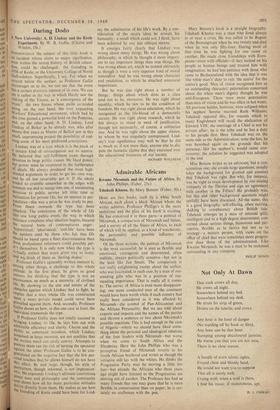SUPERFICIALLY the subject of this little book is an incident
whose claim to major significance, even within the recent history of British educa- tion, could be challenged: the founding in 1950 of Keele, or the University College of North Staffordshire. Superficially, I say. For when we scratch below the surface, as Professor Gallic encourages us to do, we can see that the event has a certain dramatic interest of its own. We can see it rather in the way in which Hardy saw the sinking of the Titanic, as 'a convergence of the twain': the two forces whose paths co'ncided being, on the one hand, the ever expanding Workers' Educational movement, which had by Ibis time gained a powerful hold on the Potteries, and, on the other hand, A. D. Lindsay, Lord 1-indSay of Birker as he already was, who after twenty-five years as Master of Balliol saw in this small, unpromising project the possibility of real- ising some of his most profound convictions.
Lindsay was of a type which it is the mark of a certain kind of emancipation not to admire. He believed that self-fulfilment came through devotion to large public causes. He liked power, but power must be employed in the furtherance of ideals. He always produced the most high- minded arguments in order to get his own way, and he all but invariably got it. If the ideals tended to crumble somewhat at the edges with constant use and to merge into one, if unrelenting tlevotion to public service left little time or inclination for private life, for an interest in per- sonalities—this was a price he was ready to pay. rrom Ibsen onwards the type has been attacked. The conversion of the whole of life into one long public event, the way in which reticence completes what idealism begins, became the natural butts of contemptuous anger: 'hYpocritical,"pharisaical,"anti-life' have been the epithets used by those who felt that life should be based upon a finer discrimination than these professional reformers could possibly per- 't themselves. It is only now when the type is viltially extinct that scorn gives' way to irony, and we. think of them as 'darling dodos.' Professor Gallie's agreeably written memoir is. among other things, a challenge to this whole attitude. In the first place, he gives us good reasons for thinking that the type is not an rcerescence, so much as a necessity, of civilised life. By showing us the size and nature of the Obstacles against which Lindsay had to fight, he implies that a man whose life was constructed uPon a more private model could never have Prevailed against them. And, secondly, Professor 9allie shows us how, in this one case at least, the Individual transcends the type. If Professor Gallic does not totally succeed in 'ringing Lindsay to life, he lays him out with admirable efficiency and clarity. Charm and the abilitY to command devotion, which Lindsay ssessed in large measure, are not qualities that ule written word can easily convey. Attempts to 1:1°EtraY them run the risk of turning the spectator against the sitter.' Professor Gallic is to be con- gratulated on the negative fact that the few per- tk°nal touches that he allows himself do not have ''S effect. By and large, though, his style of portraiture, though informal, is not impression- 1.tic. He expounds Lindsay's ultimate convictions rout man and philosophy and the community nd shows how all his more particular attitudes tdiierive directly from them. He makes us see how e founding of Keck could have been for Lind-
say the culmination of his life's work. By a con- sideration of the man's ideas he reveals his humanity : a result which could not, I think, have been achieved by any less oblique means.
It emerges fairly clearly that Lindsay was wrong about many things. He was wrong about philosophy, in which he thought it more import- ant to say important things than true things. He was wrong about art, which he treated ultimately as though it were a very superior kind of moral restorative And he was wrong about character and resolution, to which he attached unnatural importance.
But he was also right about a number of things: things about which dons as a class tend not to be, moreover. He was right about equality, which he saw to be the condition of freedom. He was right about education, which he recognised as the life-blood of a democratic society. He was right about research, which he felt always to stand in need of justification, though not necessarily, of course, a utilitarian one. And he was right about the upper classes, by whom he was singularly unimpressed. Lind- say's true significance may well be that he did a, 'much as, if not more than, anyone else to dis- pute the fantastic claims that they exercised over the educational resources of our society.
RICHARD WOLI iii Ni


































 Previous page
Previous page